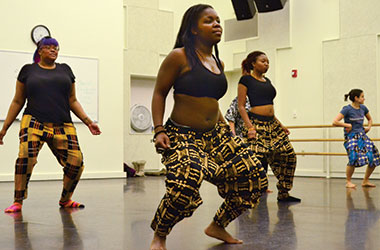Showcasing minority culture
“This movement really needs to be angrier,” Janine Tiffe playfully said as she instructed nine students of various nationalities in a traditional African warrior dance inside a locked studio on the first floor of the School of Theatre and Dance.
Tiffe is the music instructor and advisor of the Barefeet Dance Tribe, a small but active group of students who use traditional and modern African music and dance to culturally influence and educate the community. Twice a week, students throw themselves completely into a world distant from their own using drums, shakers and polyrhythmic, poetic movements borrowed from countries such as Zimbabwe, Guinea, Ghana, Nigeria and South Africa. African dance is complicated, intricate and entirely dependant upon the country from which it originates. While many African dances are visually similar to one another, their ancestral and historical significance differ greatly.
In many countries, dance is a rite of passage and declaration of the most universal human experiences. From dances of love to coming of age dances, each is a clear representation of that society’s customs and experiences.
The Barefeet Dance Tribe began its initiative with Rumbi Mupinga, a guest admissions graduate student who moved from Zimbabwe at age five. She started the group in hopes of introducing artistic and ethnic awareness to younger generations throughout the city of Kent.
“When I first started the group, I went to elementary schools here in Kent to get an extracurricular activity to kids of all ages to introduce them to a culturel different from their own,” she said.
She now has the group perform at Kent’s Africa night, as well as weddings, birthdays and competitions at other universities. There’s a low-key audition process in which anyone can perform what they know in front of Mupinga, who said no experience is needed as long as there’s a willingness to learn.
Growing up in a country so removed from the United States, Mupinga needed a means of remaining connected to her roots.
“I had to kind of find a way to get people interested in me,” she said. “To find a common connection where we can both find similar things interesting.”
In Zimbabwe, agricultural concerns are present in many of the ceremonial dances. The country produces a remarkable amount of the world’s tobacco — in 2009 it ranked 13th in the world for unmanufactured tobacco exports, according to the U.S. Department of Agriculture. Corn, wheat and coffee are the country’s other staple crops, so when a severe drought and rising fertilizer prices struck rural farmers in 2013, dance was many times used as a means of prayer in a time of violent famine. The group hopes to capture the passion in these “rain fertility” dances on stage in order to properly reflect the emotional struggle many of their ancestors have faced.
“I love my culture, so therefore, I need to showcase what it is I know,” Mupinga said. “Overall, I want people to understand different dance art forms. Here at Kent there’s a big African community, so that’s helpful to me. It’s not necessarily people from the same country, but you can just mingle with people from Africa and be close to home.”
Ruvimbo Nyemba, sophomore pre-fashion design major, joined the group a year ago after watching the group perform. Being Zimbabwaen as well, Nyemba was attracted to the idea after meeting Mupinga. Nyemba was born in the U.S, but her parents and brothers moved to the U.S. before she was born. She said the group has been an effective way to meet new people with similar experiences.
“When I first joined I didn’t know a lot of people, and it broadened my horizon,” she said. “Meeting upperclassmen — it kind of opened me up as a person and my confidence level, because at first I was kind of shy to dance on stage, and now I just love it.”
Andrea Kentebe, senior early childhood education major, went to boarding school for three years in Nigeria, where her parents are from. Therefore, her traditional music is different from rest of the group. She’s been a member for two and a half years and prefers the modern dances because it’s an equalizer.
“We all get down with the modern stuff,” she said. “We’re like sisters, we hang outside of practice and we can go to events together, and its not weird to pick out somebody or sleep over at somebody’s house. We’ve just become like a sisterhood.”
More than 100 languages are spoken in Nigeria, which illustrates the variety of cultures. Typically, Nigerian dance includes a head priest or priestess who performs dances of religious significance and respect for elders. Dances are used for summoning higher powers, giving thanks and celebrations. Decorated in colorful paint, feathers and garbs, Nigerian dancers have powerful tribal influence.
Something each member said they’ve experienced is misconceptions about Africa in general. Mupinga said she’s seen a shift in African awareness at Kent in the few years she’s been here.
“When I first got here, people were so surprised by the way I spoke,” she said. “They didn’t know that in Africa they teach English so they would say ‘Oh, you don’t sound African or you don’t have an African accent.’”
The group is set to perform at Kent’s African Night as well as various places throughout campus. Their next performance includes a tribute to Nelson Mandela. Mupinga encourages anyone interested in joining to contact her at [email protected] for an audition.
Contact Christina Suttles at [email protected].



